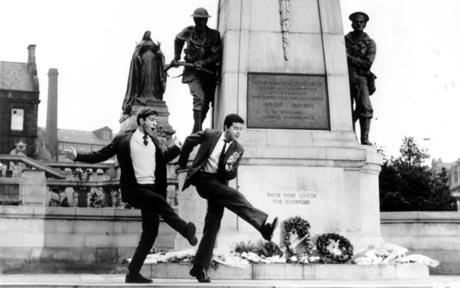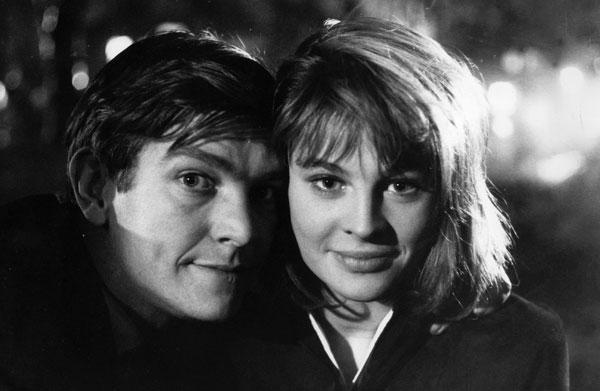John Schlesinger’s 1963 film of Keith Waterhouse’s novel is 50 years old. It’s just been reissued in a pristine print by Studio Canal, and looks stunning in its new incarnation. What began as a claustrophobic three-act play was brilliantly opened out by the film’s director, and the widescreen format feels wholly appropriate.
Watching the film again after several years, it’s the bleakness which hits home. There are laughs, but the overall tone is so sombre, so downbeat; this is a story about restricted ambition, narrowness of outlook and missed opportunities. Without Waterhouse’s wry humour, Billy Liar would be an unpleasant, grubby tale about an unlikely serial philanderer.
The film’s mood darkens noticeably in its second half, the flights of fantasy feeling less intrusive
Gwendoline Watts and Helen Fraser are both excellent as Billy’s two fiancées, despite being painted with the broadest of brushstrokes. Far more credible are Ethel Griffies and Mona Washbourne as Billy’s grandmother and mother. Their exchanges carry an emotional charge that lends the domestic scenes a plausible rawness. Billy’s retreats into baroque fantasy don’t always work; Schlesinger’s more elaborate sequences can seem a little overblown. Far more potent are the film’s smaller moments: Tom Courtenay’s scenes with the young Rodney Bewes retain their charm, and there’s a wonderful, deranged monologue (“Oi! Shadders!”) which is cruelly interrupted by Leonard Rossiter’s Shadrack.
Billy’s final bottling out, feebly turning his back on Julie Christie as the midnight train from Bradford to London slips away, is one of British cinema’s iconic moments. Thirty minutes before, we genuinely believe that he can escape. His reunion with Christie’s Liz in the dancehall is a brilliant, potent scene. For the first time, Billy has the genuine opportunity to do something unusual, radical and daring. Alas, only to be brought crashing to earth by a family emergency for which he’s partly responsible. Optimists may see this slightly ambiguous ending as upbeat – showing the protagonist finally choosing to do the right thing, returning to face up to his responsibilities instead of seeking adventure in London.
 The film’s mood darkens noticeably in its second half, the flights of fantasy feeling less intrusive. There’s a brilliant blink-and-you’ll-miss-it gag just before Billy prepares to flee, lobbing an imaginary grenade towards his hated boss before running down the dancehall stairs.
The film’s mood darkens noticeably in its second half, the flights of fantasy feeling less intrusive. There’s a brilliant blink-and-you’ll-miss-it gag just before Billy prepares to flee, lobbing an imaginary grenade towards his hated boss before running down the dancehall stairs.
Bradford is now a UNESCO recognised City of Film; Billy Liar having played a part in its bid for the award. Despite the action taking place against the backdrop of a Victorian cityscape under assault from demolition crews, many of the film’s locations are still visible. Undercliffe Cemetery has become an offbeat tourist attraction, and the steps leading down to Shadrack & Duxbury’s Funeral Parlour are marked with a commemorative BFI plaque. The war memorial around which Courtenay and Bewes dance (pictured above right) now stands in front of the National Media Museum. An elaborate military parade is orchestrated against the backdrop of a smoke-blackened Leeds Town Hall, 12 miles to the east.
There’s a mass of monochrome period detail on show – vending machines which dispense cartons of milk; the gleaming supermarket interiors. It’s the sense of a culture on the edge of transformation which lends the film much of its potency. We’re still in the early Sixties, and a cross-generational night out at the local dance hall listening to bland pre-Beatles pop was about as exciting as life could get. Everything is a little shabby. Teenagers are shown dressed like their parents, and the film’s older characters, sensing change ahead, express their unease in different ways. Billy’s grandmother rails against the immigrant staff driving buses and working at the local hospital, and Finlay Currie’s elderly Duxbury laments his hometown’s rapid transformation.
The bonus features accompanying this reissue are attractive. Interviews with Saint Etienne's Bob Stanley and actor/director Richard Ayoade are affectionate and illuminating. Better still are Courtenay and Helen Fraser, both remarkably unchanged, fondly recalling the film’s production. Courtenay in particular is a delight – explaining that he got the part instead of Albert Finney because he was physically weedier, and lamenting the fact that foreign audiences didn’t "get" Billy Liar. “Had it been Billy le Menteur, that would have been enough to make me a movie star.”
- The 50th anniversary edition of Billy Liar is available from May 6
Watch the trailer for Billy Liar














Comments
Add comment